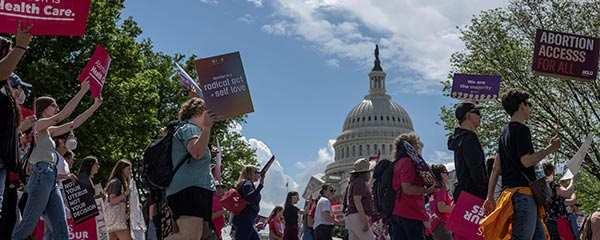Story Highlights
- 71% say state reproductive healthcare policies impact college choice
- 80% of all current/prospective students prefer states with greater access
- 86% of Democrats and 63% of Republicans prefer states with greater access
WASHINGTON, D.C. -- Seventy-one percent of currently enrolled and prospective college students say that states’ reproductive healthcare policies are at least somewhat important in their enrollment decisions. This is up slightly from 67% who said the same in late 2022. An even greater increase in the relevance of this issue to prospective and current students is also seen among those indicating these policies are highly important in their enrollment decisions (38% compared with 30% in 2022).
Both surveys were conducted after the Supreme Court’s landmark decision on abortion in Dobbs v. Jackson Women’s Health Organization on June 24, 2022.
The latest results are from the Lumina Foundation-Gallup 2024 State of Higher Education Study, conducted Oct. 9-Nov. 16, 2023, via a web survey with 14,032 current and prospective college students. This includes 6,015 students enrolled in a post-high school education program (certificate, associate or bachelor’s degree), 5,012 adults not currently enrolled with some college but no degree, and 3,005 adults who have never been enrolled in a postsecondary school or program. Gallup surveyed all groups via an opt-in online panel.
The term “reproductive healthcare policies” was not defined for the respondent but refers to an inclusive list of healthcare policies, including abortion, emergency contraception and other related healthcare issues.
Most Prefer College in a State With More Access to Reproductive Healthcare
Eighty percent of current and prospective students who say access to reproductive care is at least somewhat important in their enrollment decisions say they would prefer to attend college in a state that allows greater access to these services, while 20% say they would prefer to attend a college with more restricted access.
Majorities of current and prospective students who indicate reproductive healthcare access is at least somewhat important -- regardless of their gender -- say they would rather attend college in a state with greater access to reproductive healthcare, although the rate is higher among females (89%) than males (71%). Similarly, both major party groups feel this way, with Democrats more likely than their Republican peers to report they would prefer greater access (86% vs. 63%, respectively). Conversely, less than half as many Democrats surveyed (14%) as Republicans (37%) report they would prefer to attend college in a state with more restrictive policies.
“Reproductive healthcare policies” was included in a long list of factors that current and potential students were asked to rate in the survey according to the importance to their college enrollment decisions. The list encompasses a range of practical considerations such as cost, as well as state-specific policies such as reproductive healthcare and gun policies.
Bottom Line
In 2022, the U.S. Supreme Court Dobbs v. Jackson decision reversed the prior constitutional right to an abortion, thereby giving states broad latitude in restricting access to abortion services. The Lumina-Gallup 2024 State of Higher Education Study confirms the 2022 finding that, in the wake of Dobbs, states’ reproductive healthcare policies are at least somewhat relevant to the enrollment decisions of most current and potential students, and its importance has only increased.
While most report these policies are important to their enrollment decisions, and most say they would prefer states with greater access to reproductive healthcare, it remains unclear how much this issue will impact enrollment decisions. Most students ultimately enroll in a college within their own state, and leaving one’s state is often costly, particularly if a student is considering in-state tuition at a public college. Also, the study shows that cost remains the primary factor people consider when choosing a college. Still, given continued enrollment challenges in the U.S. higher education system, the high percentage of current and future students reporting that these state policies could impact their enrollment decisions requires close monitoring.
To stay up to date with the latest Gallup News insights and updates, follow us on X.
Learn more about how the Lumina Foundation-Gallup State of Higher Education Study works.




